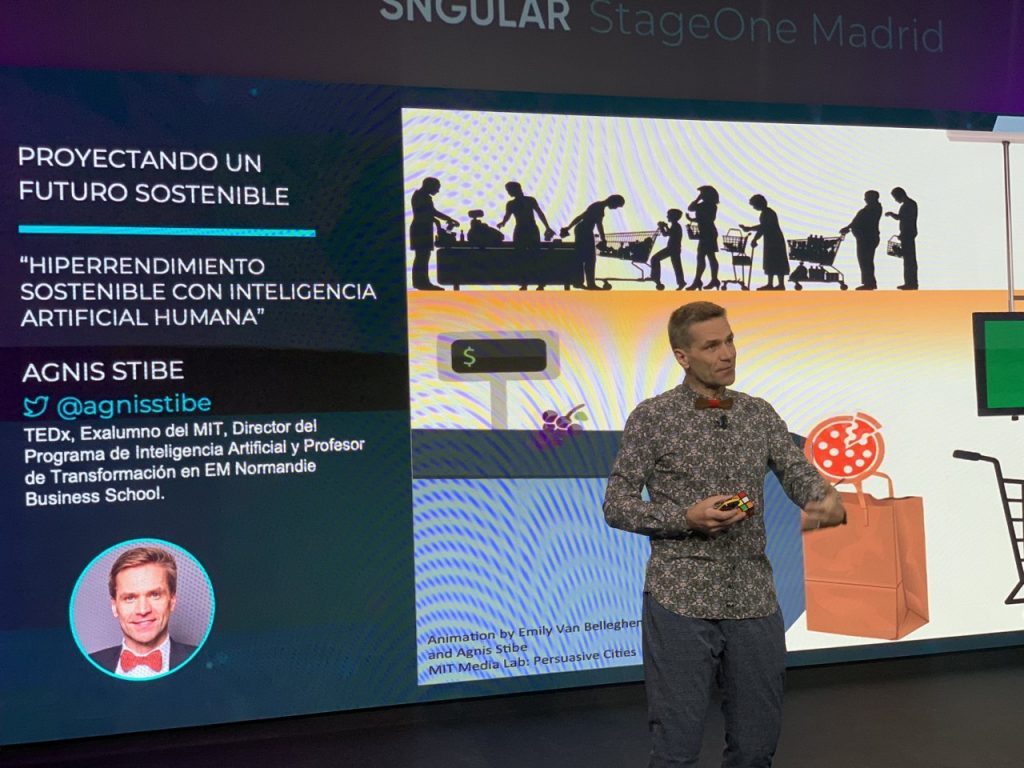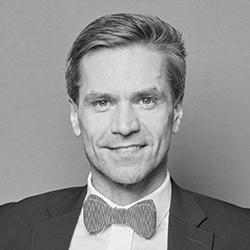This quote highlights the opening keynote on Sustainable Hyper-Performance with Human Artificial Intelligence by EM Normandie professor Agnis Stibe at the Technology for Sustainable Future event in Madrid, Spain. The event was aimed at bringing clarity to how essential it is for people and organizations to realize the importance of sustainable thinking for our future development and prosperity.
The event brought together prominent speakers and activists, such as Rasmus Almqvist, a global business leader at Elisa Videra, Almudena Pérez, a director of corporate social innovation at Fundación Hazloposible, Jesus Chapado, a head of innovation at Naturgy, Enrique Johnson, a managing partner at Thinking Heads, and Emilio García, a former cabinet director of the State Secretary for Telecommunications and Digital Infrastructures.

Technology at the service of sustainability
Technology has been and always be a tool. Just like a hammer. People then can decide what to do with it. Hit nails or break windows. So, it is our choice to use technologies for social change, or not. Technologies are serving us for what we tell them to do. If technology is pro-social, that means people were deciding and implementing this purpose. The same is true also for the opposite, negative effects of technologies on people. Thus, it is people designing technologies for the wellbeing of other people, or against the social balance. We are always the decision-makers, and technology is only a tool. So, shall we agree to choose wisely?
Generally, people and societies want to live better. The resolutions at the beginning of a new year are the most convincing evidence of that desire. Also, companies set goals to be better performing every next financial year. So, why are we not always getting to the expected outcomes? In many cases, it is because of limited awareness. And understanding how everything is intertwined and related in the world.
The same applies to everyday decisions related to sustainability. People and organizations are not always fully aware of how their actions and choices are connected to a sustainable future in society. Once such a holistic mindset is embraced, every decision can be made in a better alignment with the overall pursuit of sustainability. The role of technology is to help keep such a decision-making trajectory more consistent.
Digital divide and social contract
The more advanced technology we develop, the closer it allows us to see our human nature with all its positive as well as negative side effects. Like a huge high-resolution mirror, for example, artificial intelligence is revealing some darker sides in humans. Especially, the intention of gaining more by abusing unprotected social groups.
Of course, not everything is evil. We also have extremely bright and caring minds. As many know, the ancient symbol of yin and yang portrays how the polarities in life can be complementary, rather than opposing. With that in mind, we can revisit the questions related to the digital divide and social contract.
As any technology is only a tool, a very powerful though, it can help us minimize the digital divide and strengthen envisioned social contracts. Needless to say, it can do the exact opposite as well. Again, we as mankind can decide — what do we want in the future?
Sustainable Hyper-Performance
Hyper-performance is a state of performance when all the useless human thinking is minimized or removed completely. Such as distracting thoughts, bad ideas, negative attitudes, counterproductive opinions, prejudices, biases, and alike. Hyper-performance goes beyond traditional approaches of adding more skills, training, education, practice, and so on. Why? Because it addresses the most essential issues at the core of underperforming organizations and unbalanced societies.
When asked, most organizational managers and social leaders would agree that hyper-performance is what they need. The only problem is that they often don’t have enough clarity on how to achieve it sustainably. Therefore, artificial intelligence comes in as one of the most potent collaborators. Especially, the greatest results are possible with the right balance of human artificial intelligence.
A Story about the Purpose of Life
Many millennia ago, the earth was a ball of fire. Then it cooled down and the first conditions for an organic life emerged. So, what was it? Yes, single-cellular organisms. How long was their life? Maybe some hours or days? That’s it. Assuming there was a tiny fraction of Intelligence, the single-cellular organisms were not happy about such shot life. Thus, they thought of getting together to form multi-cellular organisms. Why? To live longer.
Now, fast forward, and today here we are, one of the most advanced multi-cellular lives on earth. Even looking back to the last centuries, we can see an obvious increase in the average lifespan on the planet in most societies. So, isn’t this straightforward? Yes, it is. But then, why is it so hard to know this fundamental truth and make our decisions by keeping it in our minds?
This story is all about emphasizing and positioning sustainability in its right place — at the core of our survival and prosperity in the future as mankind on earth. And technologies have always been at our service to help us move forward in more efficient ways.
Future-Oriented Innovations
Advanced technological innovations can be very useful in achieving many of our desired aims. Such as, maintaining an awareness of the essential role of sustainability in our societies. Providing instant feedback loops about our behaviors, so that we can learn and adapt quickly. Discovering better and more efficient ways of understanding how humans can change sustainability. Designing innovations that leverage a balance of human artificial intelligence to accelerate social hyper-performance towards a sustainable future.





